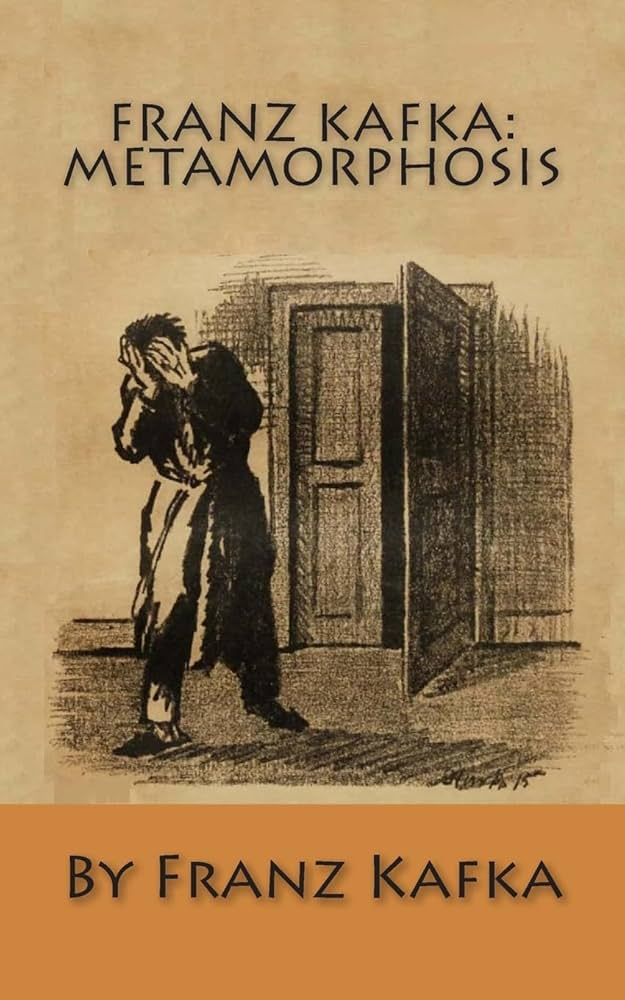
The Metamorphosis - Franz Kafka










OVERVIEW
Gregor Samsa is a hard-working man who finds solace in the monotony that is life. One morning he awakes as a bug. Franz Kafka’s surreal short novel “The Metamorphosis” dissects what it means to be human. Just like Samsa himself, his family finds themselves cornered into a wall where each decision only leads closer to the bone-chilling reality. The only reality. The Metamorphosis indulges heavily in the ideas of fantasy against reality, dehumanisation, the destitution of loneliness, nature versus nurture and rationality during times of insanity. Ultimately, are the things seen in the shadows the same as those seen in the light?
SUMMARY
Gregor Samsa awakes one morning to find himself transmogrified into a disgusting vermin. He scuttles around as he is late for work yet finds it with quite difficulty to get out of bed. His family calls for him yet he is unable to respond. Eventually his boss comes into the house as Gregor gets out of bed. His boss opens the door and is greeted by the vermin. Gregor’s father pummels him back into submission as his boss leaves. He does not get up. Then all was quiet.
A few months since then the Samsa household has found itself in a state of disarray. Gregor spends his days crawling on the floor locked in his room. The very little attention he does receive is by his sister periodically offering him leftovers from underneath the door. One day she leaves the door open for Gregor to be a part of the family again. Spiteful of the meals they share without him, he crawls around the ceiling. His father throws an apple directly at his back as he scuttles back to his room. Then all was quiet.
Half a year has passed since then and Gregor’s reclusion is as exemplified as ever. The house is in a state of dilapidated despair as the Samsa family struggles to put food on the table. They have been forced to hire their spare rooms for occasional lodgers that pass through the town. Gregor’s sister has now found herself having to get a job rather than pursuing her dream of becoming a successful violinist. One night she performs for the lodgers only to be laughed at. Gregor breaks his reclusive strike and attempts to scare the lodgers away. They only berate Gregor’s father and mother for having such a terrible insect allowed in their home at all as they make their leave.
Eventually the family gives in to their hopeless situation. They barricade Gregor in his room until he starves. His death marks the shift in the family’s situation. For the first time since his transformation they are happy. Finally unbounded by their commitment to Gregor, they desert the home, and Gregor, as they take the first train out towards the city. The novel ends with an optimistic outlook towards the future. Then all was quiet.
REVIEW
I felt nothing for this book until I finished it. Gregor’s own anguish is palpable. Kafka is exceptional at describing the growing adversity as both the family and Gregor himself lives on. Sometimes the descriptive body horror for his vermin body was disturbing and I had to physically put the book down for a bit. Despite this Gregor himself still remains semi-sentient. It's even more unnerving the fact that he is blissfully unaware of his situation, content to spend his time under a couch. Although his body is physically dilapidated, his mind still remains free. This is best indicated through the last description. How “he was still just conscious of the first signs of the general brightening outside his window.” Kafka illustrates the influence of identity and its interpersonal connection with that of consciousness, not the body.
I also believe that there is a very transparent anti-capitalist message embedded within The Metamorphosis. Besides the gleamingly obvious metaphor of his transformation, quite literally becoming a “disgusting vermin” when he is unable to work, there are several other examples of Kafka’s critique to a capitalist society throughout the text. Such as how Gregor ultimately derives his own self worth based on his ability to be a provider for his family. He watches as the entire household uproots itself as his mental health continues on the decline, both the family members and the house becoming more dishevelled as time goes on as a symbol for their state of disrepair. Gregor’s family entirely depends on him for their lavish lifestyle. When he is unable to provide this, he is a “disgusting vermin". Furthermore, Gregor’s first idea when he is turned into a bug is not the abhorrent nature of his transformation but his fears of not being afraid on time.
This motif of the castigation of capitalism is further reinforced by the appreciation of beauty. The lodgers who arrive at the house are unable to appreciate Gregor’s sister’s performance whilst Gregor himself is able to appreciate every note. Further indicative of Kafka’s disdain towards a society where work is the main byproduct of happiness, denoting those as “workers” as being mindless, unable to recognise the violin’s distinct tones of beauty. In this sense, it is only ironic that Gregor himself is an insect, a hideous creature, whilst the lodgers are no more than workers in a colony. This rescinded view on capitalism can further be developed through the ending of the text as the Samsa family is finally able to release themselves from their financial burden with an optimistic outlook. Kafka argues that the binds that restrain us in a capitalistic society are endemic to the society as a whole, not those that live in it. Whilst Gregor’s transformation was an insect, his awakening was realising that his worth was denoted by his ability to provide for his family, not by the family in itself. Quite horrifically, this could be the main reason why Gregor refused to eat the food scraps later in the text; was to not prolong his worthless life, and as such, his financial burden on the family.
It could be said that Gregor’s death was one of the only things in his life which he had any agency over at all. He constantly worked at a job he despised to pay for his father’s debts. Constantly pressured by his family’s need for a financial provider and his constant anxiety over not being able to be this provider. Gregor had to work. He had to provide. He had to fill this intricate role in his family dynamic . He was never given an option. Gregor’s death is one of a self-sacrificing martyr. One that has realised their role in the family household and has chosen to die rather than live a life where he is unable to fulfil this role. Quite ironically, it is only through Gregor’s death that his family is able to thrive again. Gregor is doomed for a life of tragedy whether he works or not. Whether he provides or not. For that is the life of an insect. To survive but never live, never thrive.
Kafka also provides interesting outlooks on the meaning of families as a whole. One where their structure is built on their ability to provide rather than that of support and love. The authour proposes this ideal in a myriad of different ways. Where once Gregor was able to look on his father with great respect, his father does not respect nor trust him after his transformation. The first thing he did when he saw Gregor was attack him. This corruption of traditional family values is best derived from the symbolism of the apple, one Gregor’s father implants into his back. It is a constant painful reminder of the disdain which his family has for him following his disability.
I don’t particularly hold any favourite nor least favourite character. They are all victims of their circumstances. None of their actions feel as if they are warranted due to their character. Gregor’s optimism throughout, while is favourable, it's only for the hope that he can return working and continue to achieve his status of a provider for his family. The Metamorphosis is surprisingly short. I wasn’t expecting the length of the text at all, nor the ending. Although given the general nihilism of the text it was warranted however it was both bleak and optimistic at the same time. To live on, the family needed Gregor to die. This ultimate decision rests on the balance between instinct and rationality. It juxtaposes the instinct of the survival of the family in contrast to Gregor’s rational decision to abstain from eating. It highlights the transformation of the family throughout the text. Where once they relied completely on Gregor for their own wellbeing, they now have been able to completely work for themselves. This final scene is evocative of this transition and the family’s growth from Gregor.
My gripes with the text are mostly trivial. Sometimes the writing seems painfully spartan and dry at parts. Watching Gregor mull over himself and his ability to be a provider becomes banal and uninteresting the 5th time he does it and the interesting stuff that is told never amounts to anything. One of the only literary techniques is imagery, which, while Kafka does have a brilliant, animated affinity for, are too far and few between to be notable. A majority of the plot points are about Gregor either being abused, attacked or dying. Every chapter ends in that exact same way. Most of this comes from the issue that the narrative is told completely from Gregor’s perspective. A deliberate decision. It could be indicative of Kafka’s choice to highlight the exact futility and hopelessness of Gregor’s situation, one where, just like the text itself, is riddled with a bleak and unfulfilling ambiance. I felt nothing for the maid and the lodgers included in the third chapter.
It’s important to note that Gregor’s transformation embraces the surrealist nature of the text. It is never explained or questioned by the family nor Gregor himself. It could very well be interpreted to be a disease or other limiting disability that prevents him from leaving the house with little to no changes in the actual text. Kafka knowingly plays into the absurdist themes of this book by making it a disgusting vermin. This exacerbates Kafka’s critique on capitalism by highlighting its often irrational and complicated nature, so much so that someone could believe they should work past debilitating diseases.
Whilst Gregor may experience the “metamorphosis” his character development is surprisingly static. Besides his potential self sacrifice at the end Gregor never changes from wanting to be seen as an ancillary provider for his family. Metamorphosis implies a transition or stage of growth which the main character undergoes, Gregor does not go through this. The only growth, or really change for that matter, is in the family itself. Each family member learns to be more self reliant, exhausted yet productive through his absence. His sister in particular since she is one of the only characters to be properly described and given a hopeful ending. A woman who “despite all the labours which had turned her cheeks pale she had recently blossomed into a pretty and quiet girl.” Rather than lament over their son’s death they embrace the hope that their daughter becomes a potential wife. This juxtaposition between Gregor and his sister can further be seen in his forced role into that of a provider in contrast to his sister’s dreams to be a creative violinist. They do not understand Gregor’s pain nor sacrifice, only their possible prosperity. Kafka criticises this shallow-minded thinking brought on by a predatory family environment through its double-standards and Gregor’s gratuitous labours.
Maybe there is a truth deep-rooted in all of us. An insect so vile and monstrous that we mask it and burden ourselves with work until it subsumes us. That we allow ourselves to believe that we’re doing the right thing, “providing”, only for loved ones to forget about us anyway, to move on and catch a train to the city. The sacrifices we undertake, the worlds above our shoulders, the skeletons in our closet. This is the absurdity of The Metamorphosis. It is the absurdity of life. The fact that Gregor is so nonchalant about his transformation underlines his nature to simply undertake more and more burdens for the family in spite of his own happiness.
I may be wrong but I do know that this is the first book where I have left with more questions than answers. This book is Kafka’s own rhetorical question. What is absurdity? Why did he ever write something like this in the first place? A book where the main character dies and never sees their self-sacrifice nor sycophantic sacrifices actuated. A book where this hero’s family forgets about him the moment they get the chance, rather fleeing from their problems. Does their failure follow them? Does Gregor’s failure define him? I hardly understand this book. I could not recommend it enough.

